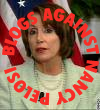Some facts that we are all too aware of, although many may not be.
Between 1999 and 2003, the government's Immigration and Naturalization Service cut its workplace enforcement against illegal immigrants by 95 percentThe fact is that it isn't just rhetoric; they're actually lies. To our faces our government tries to say the right things to everyone, passes legislation then ignores it.
Since the INS' being rolled into Homeland Security it had prosecuted 182 employers for hiring illegals in 1999
By 2003, that number dropped to four
In the same period, fines collected for hiring illegals dropped from $3.6 million to $212,000
The government had initiated fines against 417 companies in 1999.
In 2004, it fined just three.
This time around let's hold them accountable. Not just with our ballots, but in some kind of legal entanglement if they don't follow through (probably not possible, but hey, I'm not an attorney).
From the Chattanooga Times Free Press (subscription required):
Forget Washington's suddenly heated campaign season rhetoric about securing the nation's borders and stopping illegal immigration, and halting the wage suppression and job loss for American citizens that lax enforcement encourages. The Bush administration, spurred by large employers and the congressmen who take employers' desires for low-wage labor seriously, deliberately exacerbated the problem in recent years. The administration and incumbent congressmen display a lot of chutzpah to pretend now the problem did not soar on their watch.**This was a production of The Coalition Against Illegal Immigration (CAII). If you would like to participate, please go to the above link to learn more. Afterwards, email the coalition and let me know at what level you would like to participate.**
Consider the information reported by Washington Post reporters Spencer S. Hsu and Kari Lydersen on Monday. Between 1999 and 2003, they found, the government's Immigration and Naturalization Service cut its workplace enforcement against illegal immigrants by 95 percent.
The INS, known as Immigration and Customs Enforcement since it was folded into the Office of Homeland Security, had prosecuted 182 employers for hiring illegals in 1999. By 2003, that number dropped to four -- just four. In the same period, fines collected for hiring illegals dropped from $3.6 million to $212,000. The government had initiated fines against 417 companies in 1999, The Post reporters found. In 2004, it fined just three.
The Post's report went on to detail how the government has quietly, systematically retreated from efforts to track and stop the hiring of illegals over the past 20 years since it became illegal to hire undocumented workers.
More broadly, it confirmed what every expert workplace and political analysis has concluded in recent years: That Washington -- until the Bush administration began pushing immigration reform and amnesty for illegals just a few months ago -- had become a tacit collaborator with employers to allow the massive hiring of illegals by declining to enforce the law. Republicans have gone along with easy hiring of illegals to keep the business community happy, and Democrats have acquiesced to keep their voter base among immigrant communities content.
The Bush administration, and the Clinton administration before it, has been particularly lenient with large employers in a range of industries and business segments, often at the behest of congressmen tending the concerns of irate employers who saw their business threatened if the door to hiring illegals was shut.
The Post cited several examples of large INS operations against illegals that were stopped because they were too successful. One was a 1998 spring sweep of field workers for Georgia's Vidalia onion harvest, which resulted in arrests of 4,034 illegals. The other was a 1999 strike on meat packing plants in Nebraska, Iowa and South Dakota, which checked 24,148 employees and turned up 4,495 illegals.
Irate employers turned up the heat on their congressmen, senators and governors, who, regardless of political affiliation, persuaded the INS to back off such operations. Since then, enforcement has plummeted, and had virtually ended under the Bush administration.
Against that backdrop and other findings, several issues are clear. One is that 40 percent of illegals are immigrants who had arrived on legal visas and then overstayed, a statistic which suggests that they can only be tracked through their employers. Another is that illegals have become such vital components of some industries -- i.e., meat packing and poultry plants, the carpet, construction and restaurant industries -- that some businesses need adequate time to transition to a fully legal work force. A third is that enforcement of workers' legal status must again receive high priority if illegal immigration is to be controlled.
Most apparent is the urgent need for a national worker identity verification that makes it easy for employers to verify the documents that job applicants proffer for employment, and a stiff focus on enforcement of worker verification laws. Both are easily achievable. The core question is whether Washington has the will and determination to achieve them.
tag: DeMediacrat tag: Coalition Against Illegal Immigration (CAII) tag: Amnesty tag: Illegal Immigration Reform





















